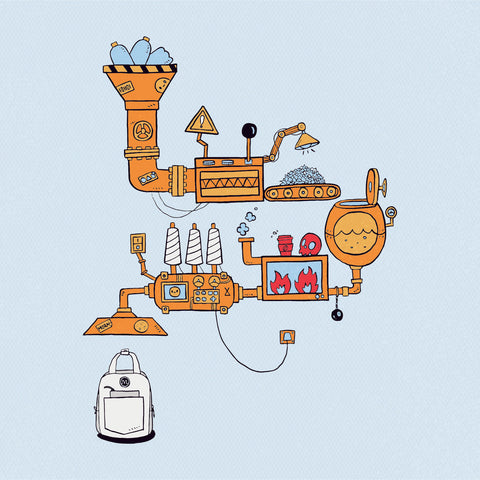Did you know that, according to Reuters, if the total amount of plastics sold worldwide in 2018 were piled up they would be higher than the world’s tallest building, the Burj Khalifa in Dubai! According to a survey conducted by Science Advances in 2017, approximately 79% of plastic waste was disposed of in landfills, 12% was incinerated and 9% was recycled around the globe. Plastic bags accounted for almost half of all plastic waste!
As a major source of plastic products, many FMCG brands and supermarkets are looking at their supply chains to mitigate environmental concerns with reduced use of plastic or naked products. Consumers nowadays are more aware of sustainable consumption, understanding that their personal needs must not override those of the environment. How can retailers serve customers and take responsibility at the same time?
Thinking About Recycling from a Manufacturing Perspective
The joy of clay is its ability to be re-fashioned into new creations over and over again. After the rise of industrialism in the 18th century, the widespread use of plastic since the 1960’s and 70’s undoubtedly contributed to a global economic take-off. As people realized its harmful environmental effects, they started to look for ways to reduce and replace it. What if plastics could be used over and over again - just like clay - giving life to new products with every iteration? Would that help alleviate the problem of plastic disposal?
The PET bottle (Polyethylene terephthalate) is industry's magic clay. Polyethylene terephthalate is a type of polyester that can be extruded or molded into plastic bottles and containers for packaging food, beverages, personal care products etc. It is recognized as a high quality recyclable plastic. Although it comes from crude oil and natural gas, 40% of its energy is trapped in the PET polymer for reuse during recycling. As PET is strong and lightweight, more products can be made with less packaging, weight and transport fuel. These factors explain why PET is a sustainable material.
What Happens to the PET Bottles and Containers That Are Not Recycled and End Up in Landfill?
As PET bottles and containers are less susceptible to biodegradation, they remain inert at landfills, reducing the risk of contaminating groundwater. Since PET bottles and containers are thinner and easy to compress, they also take up less space. According to the US Environmental Protection Agency (EPA), only 1% of municipal solid waste in the US is generated by PET containers.
Going Plastic-Free is The Ultimate Goal
According to Greenpeace, plastic does not fully decompose in the natural environment. It breaks down into plastic particles that pollute land, sea and glaciers through wind, rivers and rainwater. In 2018, the organization found that plastic waste in Hong Kong was washed out of Tolo Harbour by rivers and streams, causing severe ocean pollution. Ultimately the solution to the plastic problem is to use less plastic, for example, replacing plastic bags and utensils with reusable ones. The role of retailers and manufacturers is to minimize damage from industries which cannot go plastic-free. This is a short to medium term solution.
PET As a Raw Material - Promoting Green Fashion
Action Speaks. As a company concerned with the plastic waste problem, Moral uses recycled PET bottles in every bag it makes. Despite the increased cost, Moral is committed to protecting the environment, hoping to inspire the fashion industry and consumers towards responsible consumption. This is the only way to preserve our environment.
The recycling process works by first compressing PET bottles into pellets. These pellets are then dissolved, spun into yarn and woven into the raw material used for Moral bags.

In Moral collections, we use an average of 25 PET bottles per product, with BUDD backpack consuming the most at 29 bottles.


Food, clothing, shelter, and transportation are basic necessities. Why not choose more eco-friendly products to help our environment? During challenging times, your support is our greatest motivation.
We look forward to seeing you on our website or at our stores!
>> Moral's official website
>> Where to buy Moral's bags
Bonus: We are having SOGO Anniversary sales & Black Friday special offers till 27 November, visit our stores before it’s too late!
Featured image: Photo by Volodymyr Hryshchenko on Unsplash


Leave a comment